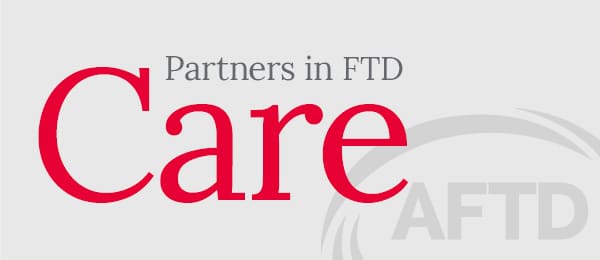Behavioral Anosognosia Complicates Diagnosis, Care and Family Relationships

Partners in FTD Care
Winter 2019
People with FTD will vary in their capacity for self-awareness or insight. Some people may experience cognitive unawareness reflected in difficulty with memory, language, spatial and temporal orientation, calculation, abstract reasoning, and putting abstract ideas into practice. People with behavioral unawareness, meanwhile, become impulsive, have little understanding of safety, and tend to be more narcissistic. Language and functional deficits are less prominent than in people with cognitive unawareness – in fact, people with behavioral unawareness often appear to be normal to all but close family and friends, who are attuned to their changing behavior.
People with behavioral unawareness are often misdiagnosed with bipolar disorder, narcissistic personality disorder, antisocial personality disorders and other psychiatric disorders until their FTD progresses beyond its early stages. They may exhibit reckless spending habits and spontaneous social outbursts, refuse treatment and diagnostic evaluations, and neglect their personal care. They may show a lack of empathy and increased self-centeredness, confounding family and social relationships, and can become hypersexual and manic. It is not uncommon for them to develop legal and financial problems, resulting in marital and/or family discord.
Families and care staff often get angry at the person with bvFTD, mistakenly considering them to be compulsive liars who make up stories purposefully. But it is important for them to remember that such behaviors are not willful. Lack of self-awareness is due to physical damage to the brain, specifically the right parietal lobe and/or frontal lobe, the anterior cingulate and the orbitofrontal cortex. The degeneration of these regions impairs one’s ability to evaluate how others respond to their behavior and adjust accordingly.
There are no medications approved to reverse or treat anosognosia. The best management and care alternatives are nonpharmacologic, including modifying communication techniques and supporting the person’s immediate understanding of his or her world, without compromising safety.
To limit problematic behaviors by people with behavioral unawareness, families and care staff can alter certain elements of their environment. This might include: disabling the internet to prevent financial losses, removing weapons, hiding food and/or car keys, and opening new limited-access bank accounts. Whenever possible, avoid trying to convince the person that they have a disease; this may escalate to agitation and aggression. If the person has a pattern of aggressive behavior, medications may be necessary to assure family safety and the person’s emotional comfort.
See also:
By Category
Our Newsletters
Stay Informed
Sign up now and stay on top of the latest with our newsletter, event alerts, and more…
